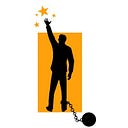Member-only story
When you’re in a hole, stop digging
Advice to today’s kids in the jungle of inner city DC
This is the first in a periodic series of interviews conducted by Pam Bailey, Rob Barton’s editor/collaborator, with recently released mentors from D.C. Jail’s Young Men Emerging program. Like Rob, they were incarcerated as a teenager for violent crimes and were released under D.C.’s Incarceration Reduction Amendment Act (IRAA).
This series was inspired when Pam observed to Rob that his mom had tried almost everything she could to steer him away from trouble. “What would you say to, or do with, a kid like you today, to try to divert him from your path?” I asked. “What works?” We decided to ask others as well, and we start with Roy Middleton, who was released last year and soon will begin work as a fellow with the Center for Educational Excellence in Alternative Settings.
What age is the most effective time to intervene?
I’d say about probably 11 or 12 years old, that phase when kids are transitioning from elementary to junior high school. By 14, I wouldn’t say you’re already “lost,” but by then there is a view of the world that defines your self-worth, in a sense. I won’t say it’s an…
